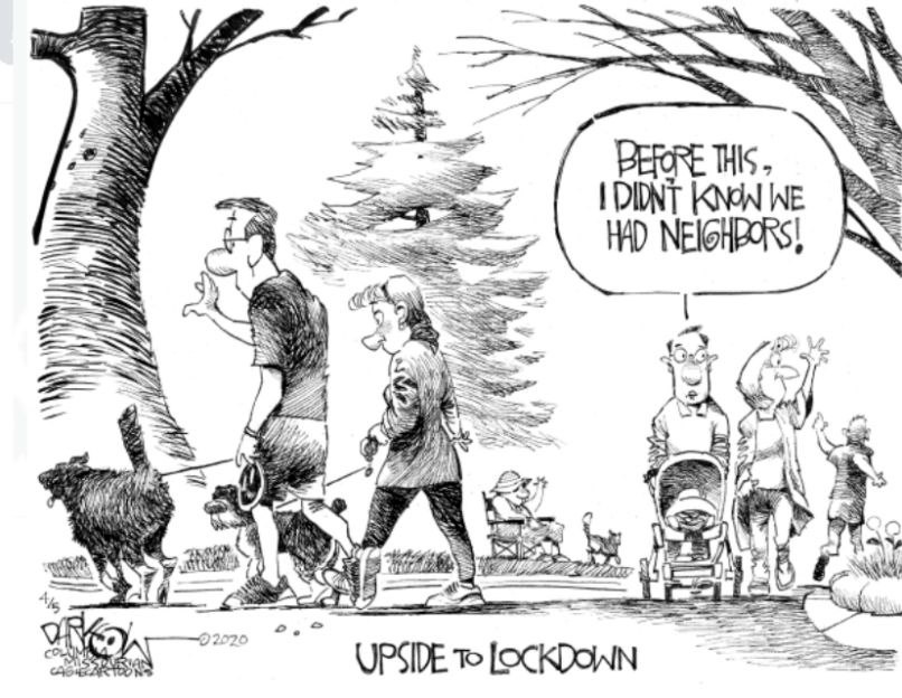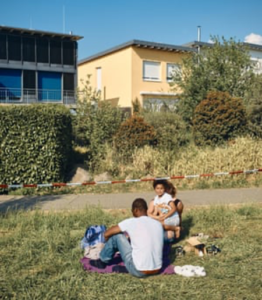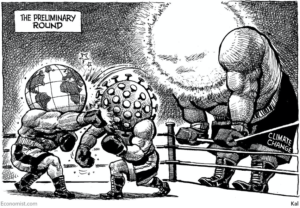Hasn’t this week been amazing. Instead of travelling overseas to catch up with old friends and family, this time we have just had to hop on our bikes and achieve the same thing. In our own City. It’s been so exciting, and scary.
The lock-down gave me a chance to have a big think. The main doubt in my mind is, will we allow this pandemic to reset our economy and our society, or, will we drift back to how things were before? We did that after the earthquakes. Let’s resist that happening a second time.
Thanks to Tony Green for this cartoon:

There will be many who will say the lockdown was unnecessary and that the damage it has inflicted on the economy was too great. I thought I would consider this challenge under a number of sub-headings.
The lockdown:
Isn’t it interesting when a “rule” is implemented for the greater good, most people honour it? Some don’t. The beauty of a democracy is that mostly we have the chance to debate it. However, this time we didn’t.
We have just had an incredible journey as a country. We have been led, really well, by a Prime Minister who has acted, with her Cabinet, on sound public health advice. “The greater good” came to the fore. If we were in this, we were in this together, was the mantra. It does appear to have paid off.
What I am interested in is, how come we generally comply with rulings like this. How most of us just say “aw shucks, let’s just get on with it”? Some of the barriers are artificial. Like a piece of tape. We stay behind it. Why?

I was thinking about this when I saw this photo in the Guardian during the week.
This is a couple in Europe who are meeting either side of a piece of tape. What makes us compliant when we are told by some faceless official that we should stand either side of it?
I have a natural desire to question everything. Pam has spent our whole married life telling me off about it. What I would question about this photo is why the hell would these people let this piece of tape stop them touching each other? What was stopping them slipping under it and embracing? Why was this tape more important than physical presence with each other? I know the official reasons, so don’t berate me from your emails.
I have spent my life cutting tapes which got in the way; and which I personally felt stopped people questioning why it was there in the first place.
What the lockdown made us think about:
I found the lockdown made me slow down in a way I seldom do, other than when on holiday. I read; and I thought. I wrote, and I spent time undertaking tasks I have put off for years. The house and garage are in a very different state. I had one friend say that if I had visited them, and stood in one place for too long, I would have been covered in paint. This same friend has discovered things in his garage that he hasn’t been able to find for years!
It has been fascinating to read what thoughtful people have written about Covid 19.
Comment by Labour MP in the UK, Tony Lloyd who contracted a really bad bout of Covid 19:
He was interviewed by the Guardian and he said:
Maybe good old Captain Tom has tapped into something where people will begin to realise that there is more to life than the next parcel from Amazon
What it’s done is focused rather than changed what I see – particularly my long-term belief that our society is disordered. If this pandemic doesn’t make us rethink what kind of world we want to live in, then I’m not sure what will. We will have to use this experience as the anvil on which we beat out this new world.
Comment by Piers Morgan:
Let’s put all the stupidity, and the nonsense, and the silliness, and the point-scoring, and the culture wars behind us. All that stuff has to be changed,” he declares. “We have to put all our concerted energy into being different people coming out of this. Better people. Because this whole crisis, I think, has been a recalibration for everybody, about everything. And to me, if it doesn’t make everybody recalibrate in some way, there’s something intrinsically wrong with you.”
In the Financial Times Arundhati Roy wrote in an incredible column:
Whatever it is, coronavirus has made the mighty kneel and brought the world to a halt like nothing else could. Our minds are still racing back and forth, longing for a return to “normality”, trying to stitch our future to our past and refusing to acknowledge the rupture. But the rupture exists. And in the midst of this terrible despair, it offers us a chance to rethink the doomsday machine we have built for ourselves. Nothing could be worse than a return to normality.
Historically, pandemics have forced humans to break with the past and imagine their world anew. This one is no different. It is a portal, a gateway between one world and the next. We can choose to walk through it, dragging the carcasses of our prejudice and hatred, our avarice, our data banks and dead ideas, our dead rivers and smoky skies behind us. Or we can walk through lightly, with little luggage, ready to imagine another world. And ready to fight for it.
Why did we accept the lockdown and what place the questioner?
Most of us just settled down and accepted the ruling of the “greater good”. Some questioned it. I have found the Editor of the Sunday Times tiresome in her moaning, week after week, about the Government. However, her views caused me to sit back and think about the role of the media as a critic. The place I finished at was, what place for the greater good and that maybe, just for once in my lifetime, the media had to hold back, for the betterment of society, and the world. However, that’s not the way they are trained. They are taught to question and to doubt. Maybe she was performing her role, as taught. I just found her writing tiresome, as did I find many of the commentators the paper has chosen to utilise. Today they have Joanne Black, Bill English’s former media minder, in today’s issue rubbishing the Government. If I hadn’t paid a year’s subscription in advance, I would have stopped the publication at the front gate. I can find much more thoughtful stuff to read elsewhere.
So, I turned to a number of commentators to challenge, and sometime vindicate, my thinking in many publications around the world:
Geoff Palmer, in Spinoff, said:
The public interest has to come first, although there must be reasoned debate on which policies to choose. I have long thought there is too much politics in New Zealand and not enough in-depth policy analysis, use of data and advice from experts. While we want the experts on tap rather than on top, their involvement is of critical importance on issues like Covid.
They were not drowned out by politics in New Zealand over the last six weeks. The media and journalists did a fine job, despite heavy economic damage to the news industry over the last 10 years.
The role of contrariety from the Spinoff:
So, I think there’s value to disrespectful questions and politicised critiques, and even some of the contrarianism, even if a lot of it is misguided or in bad faith, or simply wrong. And I think we need a space for those critiques in our mainstream politics and media instead of shouting it down and leaving it to circulate on the shadowy fringes of the internet. Because the experts are not always right and the government is not always trustworthy. If contrarians warn about the danger to our freedom in this moment, and it makes us more vigilant and we remain free, does it mean the contrarians were wrong?
In Newsroom two law professors argued about the decision to challenge the legality of the lockdown:
When a QC announced that he was going to challenge the legality of the lockdown, like most people, I thought what the hell? I have never been an intellectual; nor a great respecter of Court processes. It seemed to me that this was just a mind wank, to demonstrate to the world how clever he is. I’m sure many of you would disagree. The lockdown has happened; and we have all been changed as a result. What will happen is that if the Courts do decide to consider this matter, and they find it has been taken in error, then Parliament will change the law so the State has the power in the future. So bloody what? Why force that debate through the Courts? That is the role for Parliament.
Here’s what the learned Law Professors wrote:
When basic liberties are involved, officials and courts should err on the side of preserving those liberties. But they must also take heed of the purpose of the statute and the community the law protects.
We think judges might have a degree of reluctance about unravelling the acutely important and largely effective lockdown regime on a contestable point about legal interpretation.
I completely agree with them.
So, what have we learned from this period of lockdown?
Our economy, and our society, has had a chance to have a re-set. I remember listening to my parents, and grandparents, and older friend’s, generation talk about the resets they had experienced. World War I and II. The Flu epidemic of 1918. The Depression of the 1930’s. The work gangs. The polio epidemic. These were all re-sets. We had the neo-lib nonsense. We now have had another.
What role in the resetting of the economy for Global Warming?

We have to think about what societal practices and principles that we want to retain; and what do we change? It would be a tragedy for everything to remain as it was before the lockdown. The big challenge, which has been debated but not acted on really much at all, are the environmental crisis facing our society. Now is the opportunity to place these in the front of our societal decision making.
We have, however, re-learned an old lesson. To survive as a society, we have had to collaborate with one another. This truth has been residing in the back of people’s memories over the past few decades; but now it has been brought out and given a jolly good polish. It was interesting to read in the Guardian recently where Boris Johnson, that stand-on-the-soap-in-the-shower politician, saying “there is such a thing as society”. The iron lady must be rolling in her grave! However, Roger Douglas is still ranting on how he got it right and everybody else has got it wrong.
So, Has Covid 19 taken the bullshit factor out of our economy? The reliance on credit. The lack of savings by each of us. The wasteful way we live. The mass ignorance of the environment. We really have a great chance to reset things so the greater good is remembered again. For too long, too many of us have forgotten this.
How we kickstart the economy starting with this week’s Budget:
When I was younger a group of us used to sit down on the evening of its presentation, and analyse the Government Budget. Call me tragic, but I lapsed into my old ways this week. I haven’t listened to the Budget for years. I was delighted with the way Grant Robertson has approached his challenge. It was measured and careful. As a business owner with a business which has had 100% of its turnover cut, and with staff to pay, we are raring to go next week. We also feel supported.
I went onto Stuff, on Budget night, and there was an article with a young small business owner in Christchurch, who has done very well for the last few years, moaning that there was not enough support for his businesses in the Budget. I happen to be somebody who believes that Government has a role working alongside and supporting business, but not always running it. I believe that monopolies should be owned by Central, or Local Government. This owner was demonstrating a welfare state mentality. Exercising his desire to be sucking on the withered old tit of the state. Get on with it, man. Stop moaning.
We have to think about what we want a decent society to look like. Part of that is to have open and healthy debate about what could be, and what we should stop. That applies in all of our personal lives and for public and private businesses and structures. It’s re-setting time.
In an article in Spinoff about the economy they wrote:
Prior to the budget, prime minister Jacinda Ardern underlined this, describing employment as the government’s “number one priority”. She characterised its reasoning for this by leaning on another Labour government.
“It harks back to the sentiment of Norman Kirk, that all anyone ever needs is something to do, somewhere to live, someone to love and something to hope for,” said Ardern. “Employment helps form a foundation. It supports families, pays the bills, helps provide self-value and worth, and when times are tough like this, workplaces can provide an important support network.”
While the state employs hundreds of thousands, job losses will be almost entirely confined to the private sector, and thus any recovery depends in large part on how the business community makes it through the rest of the year. Based on the verdict of those well-placed to understand its fears and hopes, this budget is of a scale commensurate to the challenge. “What the business sector requires is certainty and confidence,” said Business NZ’s Hope. “This provides a continuation of the government’s view that business is going to be central to the recovery.”
What might a well-being economy look like?
There will be much discussion on what exactly is a well-being economy. We will all have our own thoughts. Below you will find a link to the thoughts of a business leader on how we could trade our way out of the current challenges. It is positive, and it promotes local jobs, and our place in the world economy. We must get in behind local initiatives, to get things going again.
In the Spinoff this week I rather liked this description:
But a wellbeing approach reveals our more complex reality. It exposes the hidden liabilities of particular projects: they may spoil vital ecosystems, or degrade social cohesion through Treaty breaches, or lock us into risky dependencies on oil or high-volume tourism. It also reminds us that not all infrastructure is made of concrete and tar seal. This is the time to invest in human capabilities, most obviously public health and mental wellbeing, but also skills for people pivoting to new jobs. So too the “natural infrastructure“ of trees, waterways and wetlands; and the “social infrastructure“ of trust, connection and culture that strengthens community resilience.
Upgrading this infrastructure creates jobs too – and jobs that may better match the skills of people losing jobs from hospitality, tourism and retail. Repairing local ecosystems, revitalising local communities, rallying round those in need – this is care work that is often poorly paid or not paid at all, left to volunteers. Folding this into the paid economy only requires us to recognise the value such work provides.
Philosopher Krushil Watene argued recently, “When our Covid-19 lockdowns end, we can’t afford to stop caring about collective well-being … protecting each other to protect ourselves.” Policy makers haven’t always been good at accounting for these broad foundations of wellbeing. What the current crisis shows is that, if they keep neglecting them, the consequences will eventually take a form that no economist can ignore.
Finally, a tale of caring and sharing:
I will conclude with a wonderful story a friend told to me recently. They live in the Nelson region. Her neighbour told her that the firm this neighbour works for was struggling getting face masks for their staff (I heard of a hospital recently which used to buy masks for $12 per packet, now they are $80).
My friend offered to make some for them. Her motivation? She wanted to do her bit. She worried about young people with families to feed, and mortgages to pay. Of overseas people waiting to receive funds from their family member in NZ working, in order that they can survive.
My friend got into action. They supplied inadequate materials to her (an excellent seamstress) which made making the masks difficult; but she persisted with it. Each mask took 30 minutes to make. She made 160. Just to help out. That lovely contribution to their local community, and to that company, is the sort of commitment which will pull us through some of the challenging times ahead of us.
Leave a Reply